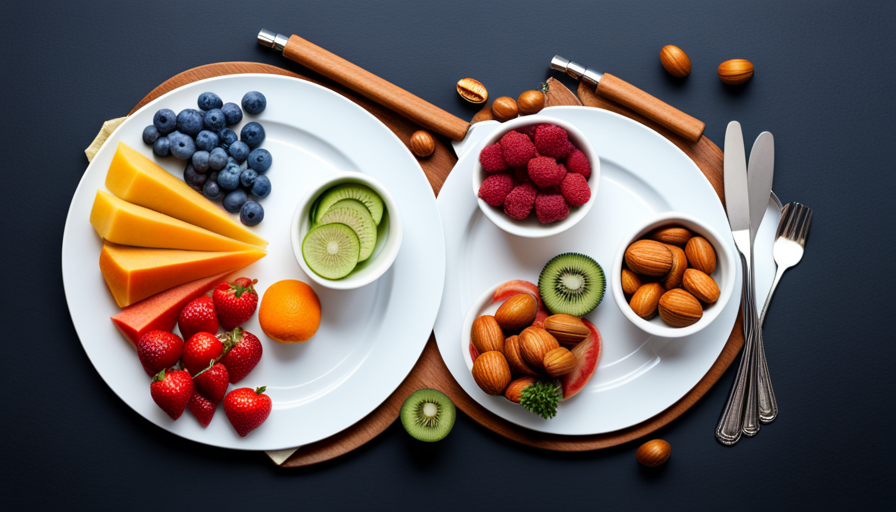Visualize your body as a well-maintained engine, always requiring fuel to function efficiently. Similar to a vehicle, the type of fuel you select can significantly affect its overall performance.
In this fast-paced world, we often overlook the importance of nourishing our bodies with wholesome, nutrient-rich foods. One dietary approach that has gained popularity in recent years is the raw food diet. This eating style involves consuming uncooked, unprocessed, and mostly plant-based foods, such as fruits, vegetables, nuts, and seeds. It’s like giving your body the purest, most natural form of fuel.
But what exactly are the benefits of a raw food diet? In this article, we will explore the numerous advantages this lifestyle can bring, including:
- Increased energy levels
- Improved digestion
- Strengthened immune system
- Weight loss
- Reduced risk of chronic diseases
- Increased nutrient absorption
- Enhanced mental clarity
- Alkalizing the body
- Promoting environmental sustainability
So, hop aboard the raw food train and let’s discover the transformative power of this nourishing approach to eating.
Key Takeaways
- Increased energy levels
- Improved digestion
- Strengthened immune system
- Weight loss
Increased Energy Levels
One of the key benefits of a raw food diet is that it boosts your energy levels, allowing you to feel more energized throughout the day. When you eat raw foods, you’re consuming them in their natural state, which means they aren’t processed or cooked. This preserves the nutrients and enzymes present in the food, providing your body with a rich source of vitamins, minerals, and antioxidants.
These nutrients are essential for maintaining optimal energy levels and supporting various bodily functions. Raw foods are particularly beneficial for increasing focus and improving athletic performance. The nutrients in raw fruits, vegetables, nuts, and seeds provide a steady stream of energy, preventing the crashes that can occur with processed foods. This sustained energy allows you to stay focused and alert throughout the day.
Additionally, raw foods are easily digestible, which means your body can efficiently absorb the nutrients and convert them into energy. Improved digestion is another advantage of a raw food diet. Raw foods are rich in fiber, which helps regulate digestion and promotes a healthy gut. A healthy gut is essential for nutrient absorption and overall well-being.
By incorporating raw foods into your diet, you can support a healthy digestive system and experience improved digestion. A raw food diet can increase your energy levels, improve focus, enhance athletic performance, and promote better digestion. By fueling your body with nutrient-dense raw foods, you can experience the benefits of increased energy and overall well-being.
Improved Digestion
Improve your digestive system by incorporating a raw food lifestyle – you’re what you eat, so choose wisely!
One of the key benefits of a raw food diet is improved digestion. Raw foods are rich in fiber, enzymes, and probiotics that promote a healthy gut. Fiber helps regulate bowel movements, preventing constipation and promoting regularity. Enzymes in raw foods aid in the breakdown and absorption of nutrients, ensuring your body can efficiently utilize the food you consume. Probiotics, found in fermented raw foods like sauerkraut and kimchi, promote a healthy balance of gut bacteria, essential for optimal digestion.
In addition to promoting gut health, a raw food diet can also help identify and manage food sensitivities. When you eliminate processed and cooked foods from your diet and focus on fresh, natural ingredients, it becomes easier to identify which foods may be causing digestive discomfort. By reintroducing cooked foods one at a time, you can pinpoint specific triggers and make informed choices about what to include in your diet.
With improved digestion and the identification of food sensitivities, a raw food diet can lay the foundation for a strengthened immune system. By nourishing your body with nutrient-dense, unprocessed foods, you provide the essential vitamins, minerals, and antioxidants needed to support your immune function. Transitioning to a raw food lifestyle can have a profound impact on your overall health and well-being.
Strengthened Immune System
Boost your immune system and protect your health by incorporating a raw food lifestyle – it’s time to strengthen your body’s defense system! A raw food diet can have a significant impact on your immune system, leading to a stronger and more resilient body.
When you consume raw foods, you provide your body with essential nutrients, vitamins, and minerals that are crucial for a well-functioning immune system.
One of the key benefits of a raw food diet is a boosted metabolism. Raw foods are rich in enzymes, which help to break down food more efficiently and increase your metabolism. This means that your body can process nutrients more effectively, leading to improved overall health and a stronger immune system.
Additionally, a raw food diet can promote a balanced gut microbiome. The gut microbiome plays a vital role in your immune system, as it helps to regulate inflammation and fight off harmful pathogens. Raw foods, such as fruits, vegetables, and fermented foods, are rich in fiber and beneficial bacteria that can support a healthy gut microbiome.
Transitioning to a raw food diet can also have a positive impact on weight loss. By incorporating more raw fruits and vegetables into your diet, you can reduce your calorie intake while still providing your body with essential nutrients. This can help you achieve and maintain a healthy weight, which is important for overall health and immune function.
Weight Loss
Maximize your weight loss potential and achieve your fitness goals by incorporating a raw food lifestyle. When it comes to shedding those extra pounds, a raw food diet can be a game changer. By consuming raw, unprocessed foods, you provide your body with a multitude of benefits that support weight loss.
One of the key advantages of a raw food diet is its ability to boost metabolism. Raw foods are rich in enzymes, which help break down food more efficiently and speed up the metabolic rate. This increased metabolism can lead to more calories being burned throughout the day, aiding in weight loss.
Additionally, a raw food diet can help control appetite. Raw fruits and vegetables are packed with fiber, which helps you feel fuller for longer. By maintaining a feeling of satiety, you’re less likely to overeat or indulge in unhealthy snacks, thus promoting weight loss.
Incorporating a raw food lifestyle can be the key to achieving your weight loss goals. Not only does it boost metabolism and control appetite, but it also provides your body with essential nutrients and antioxidants. By nourishing your body with raw, unprocessed foods, you’re reducing the risk of chronic diseases.
Transitioning to a raw food diet can be a positive step towards a healthier and more vibrant life.
Reduced Risk of Chronic Diseases
By incorporating a raw food lifestyle, individuals can significantly reduce their risk of developing chronic diseases, such as heart disease, cancer, and diabetes, according to a study published in the Journal of Nutrition.
This way of eating focuses on consuming unprocessed, whole foods in their natural state, which provides numerous health benefits. One of the key advantages of a raw food diet is improved cardiovascular health. Raw foods are typically low in saturated fats and cholesterol, which are known to contribute to heart disease. Additionally, raw fruits and vegetables are rich in fiber, antioxidants, and phytochemicals, all of which promote heart health and reduce the risk of developing cardiovascular diseases.
Furthermore, a raw food diet has been shown to reduce inflammation in the body. Chronic inflammation is a common underlying factor in many chronic diseases, including heart disease, cancer, and diabetes. Raw foods are abundant in nutrients, vitamins, and minerals that have anti-inflammatory properties. For example, fruits like berries and vegetables like leafy greens contain compounds that can help reduce inflammation and protect against chronic diseases.
Adopting a raw food diet can offer significant benefits in terms of improved cardiovascular health and reduced inflammation. These advantages can greatly decrease the risk of developing chronic diseases such as heart disease, cancer, and diabetes.
Transitioning into the subsequent section about improved skin health, it is important to note that a raw food diet can also have positive effects on the appearance and health of the skin.
Improved Skin Health
Transitioning into the subsequent section about ‘improved skin health’, it’s remarkable how a raw food lifestyle can work wonders for your skin. One of the major benefits of a raw food diet is that it promotes natural skincare, resulting in a glowing complexion.
When you consume raw fruits and vegetables, you’re providing your body with a plethora of essential nutrients, antioxidants, and enzymes that are crucial for maintaining healthy skin. Raw foods are rich in vitamins such as vitamin C and E, which play a vital role in collagen production, helping to keep your skin firm and youthful. Additionally, the antioxidants found in raw foods help combat free radicals, preventing premature aging and the formation of wrinkles. Raw foods also contain enzymes that aid in the digestion and absorption of nutrients, allowing your body to effectively utilize the vitamins and minerals necessary for healthy skin.
Furthermore, raw foods are hydrating and help improve the overall moisture levels of your skin. They’re also low in processed sugars and unhealthy fats, which are known to contribute to skin problems such as acne and inflammation.
Transitioning into the subsequent section about ‘increased nutrient absorption’, it’s clear that a raw food diet not only improves skin health but also enhances nutrient absorption throughout the body.
Increased Nutrient Absorption
Boost your body’s ability to absorb essential nutrients by incorporating a raw food lifestyle into your daily routine. Here are four ways a raw food diet can increase nutrient absorption and promote overall health:
-
Enhanced Gut Microbiome: Raw fruits, vegetables, and nuts are rich in fiber, which acts as a prebiotic to nourish the beneficial bacteria in your gut. A diverse and healthy gut microbiome facilitates better nutrient absorption and supports overall digestion.
-
Balanced Blood Sugar Levels: Raw foods, especially those with a low glycemic index, can help regulate blood sugar levels. By avoiding processed foods and consuming whole, unprocessed foods in their natural state, you can reduce the risk of blood sugar spikes and crashes, promoting stable energy levels throughout the day.
-
Increased Enzyme Activity: Raw foods contain natural enzymes that aid in the breakdown and absorption of nutrients. Cooking can destroy these enzymes, but by consuming raw foods, you ensure that your body can fully utilize the nutrients present in the food.
-
Higher Nutrient Density: Raw fruits and vegetables are packed with essential vitamins, minerals, and antioxidants. By eating them in their raw state, you maximize their nutrient content and absorb more of these vital nutrients.
By incorporating a raw food diet into your lifestyle, you can enhance your gut microbiome, balance blood sugar levels, increase enzyme activity, and benefit from the higher nutrient density of raw foods. This ultimately supports your overall health and sets the stage for enhanced mental clarity in the subsequent section.
Enhanced Mental Clarity
Improve your mental clarity and experience a heightened sense of focus and clarity by incorporating this powerful lifestyle change into your routine. One of the major benefits of a raw food diet is its ability to enhance mental clarity. When we consume raw, unprocessed foods, we provide our bodies with essential nutrients that support optimal brain function. This, in turn, improves focus and cognitive function.
Several studies have linked the consumption of a raw food diet to improved cognitive abilities. Raw fruits and vegetables are rich in antioxidants, vitamins, and minerals that nourish our brains and protect against oxidative stress. These nutrients help to improve memory, concentration, and overall cognitive performance.
Furthermore, a raw food diet is often low in processed sugars and unhealthy fats, which can negatively impact brain health. By avoiding these harmful substances, we can maintain stable blood sugar levels and provide our brains with the energy they need to function optimally.
Incorporating more raw foods into your diet can also have a positive impact on mood and mental well-being. A study published in the journal Nutritional Neuroscience found that individuals who followed a raw food diet reported lower levels of depression and anxiety.
Transitioning to a raw food diet can significantly enhance your mental clarity, focus, and cognitive function. In the next section, we’ll explore how this diet can also alkalize the body, promoting overall health and vitality.
Alkalizing the Body
To achieve a more alkalized body, you may find it challenging at first to adjust your eating habits, but the long-term benefits for your overall health and vitality will make it worth the effort.
One way to alkalize your body is by incorporating alkaline water into your diet. Alkaline water has a higher pH level, which helps neutralize the acidity in your body. This can promote better digestion, improve hydration, and boost your immune system. Additionally, consuming alkaline water may also help reduce the risk of developing chronic diseases, such as heart disease and cancer.
Another way to alkalize your body is by focusing on maintaining a proper pH balance through your diet. Raw fruits and vegetables are naturally alkaline and can help neutralize the acidity in your body. These foods are rich in essential nutrients, antioxidants, and fiber, which can support your overall health and well-being.
Incorporating alkalizing foods and drinks into your daily routine can have numerous benefits for your body. It can help reduce inflammation, improve energy levels, and support weight management. By alkalizing your body, you’re creating an environment that promotes optimal health and vitality.
Transitioning into the subsequent section about ‘environmental sustainability’, it’s important to consider the impact our food choices have on the environment.
Environmental Sustainability
Transitioning into the subsequent section on environmental sustainability, it’s crucial to consider how our food choices impact the health of our planet.
When it comes to a raw food diet, there are several benefits that contribute to environmental sustainability. One significant aspect is the reduction of food waste.
A raw food diet encourages the use of whole, unprocessed foods, which means less packaging and fewer processed products. This helps reduce the amount of waste that ends up in landfills. Additionally, by consuming raw foods, we are less likely to overbuy and waste perishable items, as they’re consumed in their natural state.
Another important aspect of environmental sustainability is sustainable agriculture practices. Raw food diets often emphasize the consumption of organic and locally sourced produce. Organic farming methods prioritize soil health, biodiversity, and water conservation. By supporting these practices, we contribute to a healthier ecosystem and reduce the environmental impact of conventional farming methods, such as the use of pesticides and synthetic fertilizers.
A raw food diet not only benefits our personal health but also has positive implications for the health of our planet. By reducing food waste and supporting sustainable agriculture practices, we can make a difference in creating a more environmentally sustainable future.
Frequently Asked Questions
Is it necessary to completely eliminate cooked and processed foods from my diet in order to follow a raw food diet?
To follow a raw food diet, it’s not necessary to completely eliminate cooked and processed foods. However, there are benefits to doing so. By eliminating cooked foods, you preserve the natural enzymes and nutrients found in raw fruits, vegetables, nuts, and seeds. This can improve digestion, boost energy levels, and support weight loss. Additionally, raw foods are generally lower in calories and can promote a healthy lifestyle. While it’s not mandatory, eliminating cooked foods can enhance the benefits of a raw food diet.
Can a raw food diet provide all the necessary nutrients and vitamins that my body needs?
Yes, a raw food diet can provide all the necessary nutrients and vitamins that my body needs. Raw food diets emphasize the consumption of whole, unprocessed fruits, vegetables, nuts, and seeds, which are rich in essential nutrients. These foods are often high in vitamins A, C, and E, as well as minerals like magnesium and potassium. However, it’s important to ensure a varied and well-balanced diet to meet all nutritional needs. Consulting with a healthcare professional or registered dietitian can help ensure proper nutrient intake.
Are there any potential drawbacks or risks associated with following a raw food diet?
While a raw food diet has its benefits, it’s important to consider potential drawbacks and risks.
Drawbacks may include difficulty in meeting nutritional needs, especially for certain vitamins and minerals that are more easily absorbed from cooked foods.
Risks can include bacterial contamination from raw animal products, such as meat or eggs, which can lead to foodborne illnesses.
It’s crucial to ensure proper food handling and hygiene practices to minimize these risks and maintain a balanced, nutrient-rich diet.
How can I ensure that I get enough protein on a raw food diet, especially if I don’t consume animal products?
To ensure adequate protein intake on a raw food diet without consuming animal products, there are plenty of protein sources available. Vegan options like legumes, tofu, tempeh, and plant-based protein powders can provide the necessary protein.
Sprouting legumes and grains also increase their protein content. Additionally, seeds, nuts, and certain vegetables like broccoli and spinach contain significant amounts of protein.
By incorporating these protein-rich foods into my diet, I can meet my protein needs on a raw food vegan diet.
What are some practical tips for transitioning to a raw food diet and maintaining it in a busy lifestyle?
When transitioning to a raw food diet and maintaining it in a busy lifestyle, there are some practical tips that can help.
First, meal prepping is key. Prepare raw meals in advance, such as salads or raw wraps, and store them in containers for easy grab-and-go options.
Another strategy is to pack raw snacks like fruits, nuts, or raw energy bars when traveling.
These tips can make it easier to stick to a raw food diet and ensure you stay nourished even with a hectic schedule.
Are Raw Food Diets Beneficial for Detoxing the Body?
Many people believe in the effectiveness of raw food detox for cleansing the body. Raw food diets are thought to help remove toxins and promote overall health. However, scientific evidence supporting the effectiveness of raw food detox specifically for detoxing the body is limited.
Conclusion
In conclusion, adopting a raw food diet can have numerous benefits for overall health and well-being. By fueling our bodies with unprocessed, nutrient-rich foods, we can experience increased energy levels, improved digestion, and a strengthened immune system.
Furthermore, the alkalizing effects of raw foods help maintain a balanced pH level in our bodies. This lifestyle choice also promotes weight loss, reduces the risk of chronic diseases, and enhances mental clarity.
Embracing a raw food diet not only benefits us individually, but also contributes to environmental sustainability. It’s like nourishing our bodies with a vibrant rainbow of nature’s finest ingredients.










